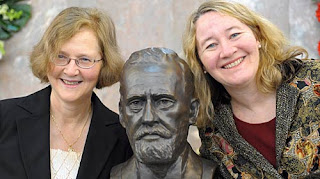
From the AP story on the three new laureates:
STOCKHOLM — Americans Elizabeth H. Blackburn, Carol W. Greider and Jack W. Szostak won the 2009 Nobel Prize in medicine today for discovering a key mechanism in the genetic operations of cells, an insight that has inspired new lines of research into cancer.
The trio solved the mystery of how chromosomes, the rod-like structures that carry DNA, protect themselves from degrading when cells divide.
Their work is plenty impressive, helping us to better understand cancer, but I will admit that what most caught my eye was the photograph accompanying the AP story, as it appeared in the LA Times. That's Blackburn and Greider above, flanking a bust of Paul Ehrlich, the great German medical researcher, who was awarded his own Nobel Prize for Medicine back in 1908.
Ehrlich--not to be confused with Paul R. Ehrlich, the neo-Malthusian scientist, author of disastrously wrongheaded 1968 book, The Population Bomb, and many similar works in the decades since--is perhaps best known through a 1940 Hollywood movie made about his life, starring Edward G. Robinson, "Dr. Ehrlich's Magic Bullet."
As that title suggests, Ehrlich was a scientist who had a perfectly forthright approach to disease. You identify the disease--diptheria, syphilis--and then you seek to shoot it with a "magic bullet." That is, a medicine that destroys the disease, but does not destroy the surrounding tissue.
At their best, metaphors provide not only guides for understanding but also serve as tools for action. So the "magic bullet" metaphor is important because it reminds us that medicine is a war against disease.
It's a war we can win, but we have to strategize, mobilize, industrialize and tangibilize that great effort. It is not a task for the fainthearted.